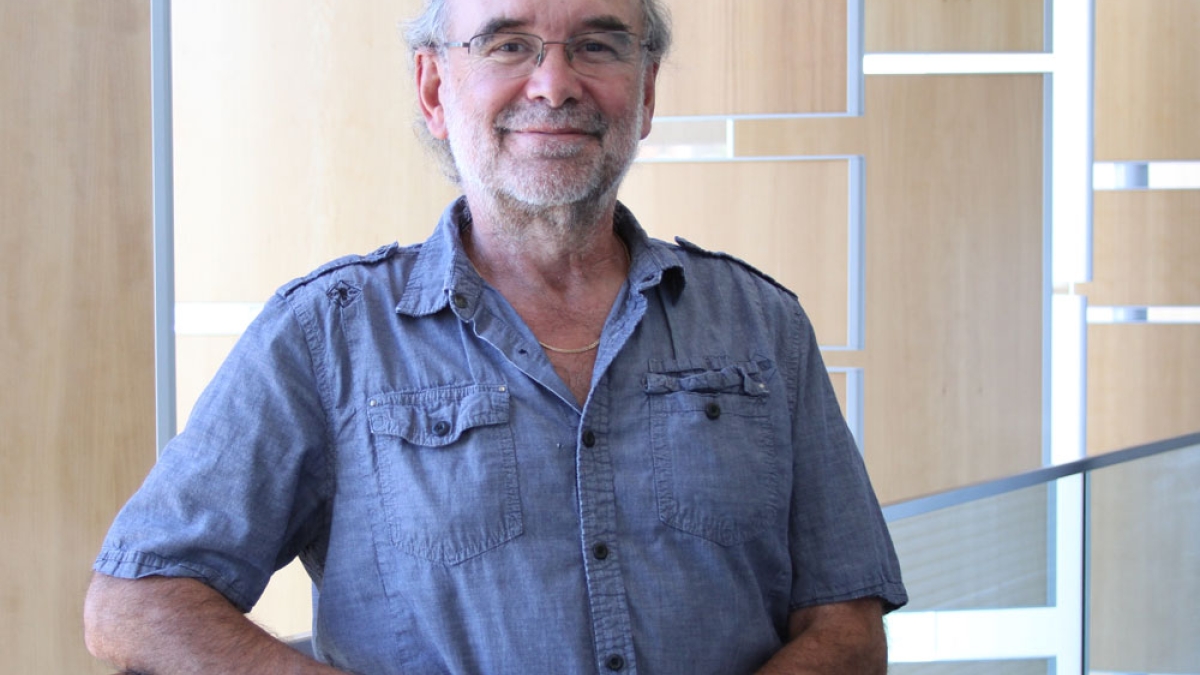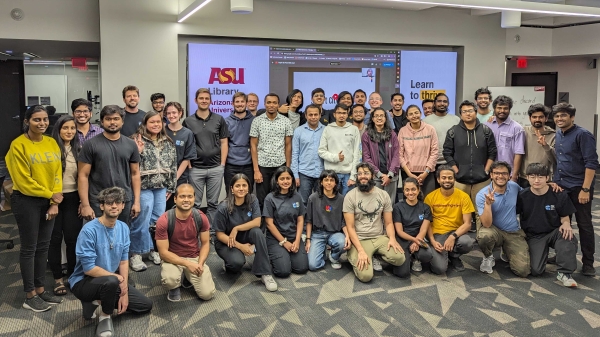International expert of viruses, infectious diseases and cancer to lead ASU center
Virologist Grant McFadden to lead Biodesign Institute's Center for Immunology, Vaccines and Virotherapy

Grant McFadden, an internationally known virologist, will lead Biodesign's Center for Immunology, Vaccines and Virotherapy. Photo by Michelle Saldana/Biodesign Institute
With an estimated 600,000 cancer deaths in the U.S. this year alone and a looming crisis in antibiotic resistance, there is an urgent societal need to develop novel solutions.
The Biodesign Institute at Arizona State University has hired internationally renowned virologist Grant McFadden to direct a major research initiative that will develop cutting-edge strategies to treat cancer and prevent infectious diseases.
McFadden has been tapped to lead the Biodesign Center for Immunology, Vaccines and Virotherapy, whose mission is to investigate and overcome cancer and infectious diseases, among the leading killers in the U.S. and globally.
“Grant McFadden is the ideal candidate to lead Biodesign Institute efforts in the invention and development of next-generation cancer treatments, vaccines and immune-based therapeutics, and also possesses the necessary entrepreneurial know-how to help translate our discoveries to overcome the worldwide disease burden,” said Josh LaBaer, interim executive director of the Biodesign Institute.
Exploring how viruses kill cancer cells
McFadden is best known as a key originator of “anti-immunology,” or the study of how pathogens can evade the immune system.
His work aims to understand the precise mechanisms that allow viruses to live in the body, often for many years, by actively counteracting the inflammatory process associated with the normal immune response.
A successful biotech entrepreneur, McFadden’s work has spun off a variety of new initiatives, including co-founding (with Dr. Alexandra Lucas) a biotech company, Viron Therapeutics, in London, Ontario. Viron is the first company to be devoted to developing anti-immune molecules from viruses as novel drugs to treat immune-based and inflammatory diseases in humans.
McFadden was attracted to the Biodesign Institute by the breadth of research activity and talents of innovative scientists who have been at the forefront of infectious disease research. In alignment with the Biodesign approach, McFadden uses the biological design concept to exploit the biology he discovered in viruses to also develop novel virus-based therapies to treat cancer.
Attracted by Biodesign’s success in infectious disease research
“Biodesign’s innovative ideas, technologies and research impact are well-regarded in the research community,” said McFadden. “I am impressed by the spirit of collaboration and interaction among the faculty. Biodesign has successfully demonstrated that combining disciplines such as bioinformatics, computational biology, engineering and physics is the key to making significant progress in today’s modern era of infectious disease research.”
McFadden hopes to build on these successes by developing novel therapeutic strategies against specific disease targets, including adapting poxviruses to treat cancers that are currently hard to eliminate with available therapies.
“The field of cancer therapeutics is undergoing a revolution in treatment with new immunological and virus-based therapeutics in various stages of clinical trials and commercialization,” said McFadden. “But these treatments are often very expensive, and despite incredible progress and national headlines, all too often, patients who have initially made dramatic recoveries after current therapies later succumb to cancer as it grows resistant to the initial treatment.”
Building on Biodesign’s existing faculty expertise to reduce the number of cancer victims through earlier detection efforts in biomarker discovery and diagnostics, McFadden sees an opportunity to develop cancer-specific viruses that can provide a more robust immune response, new classes of drugs and antibodies that can block specific immune system pathways (called immune checkpoint inhibitors), and strategies to help optimize cancer patients' own immune system to more effectively eliminate their cancers.
Seeking a better understanding of interactions between humans and viruses
Though antibiotics ushered in a new era of post-World War II disease prevention with the discovery of penicillin nearly 90 years ago, increasingly, bacteria are outwitting these strategies. To thwart this, the White House has recently announced a national initiative to combat the growing threat of antibiotic resistance.
McFadden believes a “back to basics” approach at the Biodesign Center for Immunology, Vaccines and Virotherapy (formerly the Center for Infectious Diseases and Vaccinology) will fuel fundamental research in understanding the dynamic interaction between a pathogen, host and its environment in the human body and will lead to “new revelations for the control and treatment of infectious diseases, including the path to drug resistance.”
McFadden’s own research interests overlap with those of ASU poxvirus researcher Bertram Jacobs. They’ve known each other for the past quarter century, since first going on an Idaho whitewater rafting adventure together after a poxvirus scientific conference.
“Grant has been a longtime friend, colleague and poxvirus innovator,” said Biodesign virologist Jacobs, director of the School of Life Sciences, where McFadden will hold a faculty appointment.
“He’s watched ASU’s tremendous research growth over the last decade and the success and impact of the Biodesign Institute. I’m personally thrilled to have Grant join ASU and look forward to working with him to build and grow our microbiology and biotechnology academic programs within the School of Life Sciences (SOLS) and attract and train the next generation of faculty.”
Enriching Arizona’s clinical research and partnerships
McFadden will also lead efforts to strengthen ties with clinical partners including Mayo Clinic, Banner Health, Phoenix Children’s Hospital, Dignity Health and the Barrow Neurological Institute. It is expected that clinical success will catalyze commercialization efforts through intellectual-property patents, licensing and partnerships with biotechnology and pharmaceutical industries, as well as encourage new spinouts companies.
“I like being interdisciplinary,” said McFadden. “I like encouraging innovation. I like scientific collaborations. I like the spirit of discovery. I like all of that, and I especially like the frontier spirit here. It’s infectious. And I can’t wait to start a new adventure.”
McFadden will officially begin lab research activities by the end of 2016.
Prior to joining ASU, McFadden was a professor in the Department of Molecular Genetics at the University of Florida’s College of Medicine. He has served as director, Viral Immunology and Pathogenesis Laboratories at the Robarts Research Institute, London, Ontario; co-director of the BioTherapeutics Research Group at the Robarts Research Institute, and a professor of Microbiology and Immunology at the University of Western Ontario. He is currently the outgoing president of the American Society for Virology and is the co-editor-in-chief of the journal PLoS Pathogens.
Over the past 30 years, McFadden has been responsible for numerous scientific publications and discoveries related to poxviruses and their anti-inflammatory activities. He has successfully discovered, characterized and published the activities of numerous viral proteins, as well as the development of cancer-killing poxviruses, in leading international, peer-reviewed journals. McFadden holds a doctorate from McGill University.
More Science and technology

SpaceHACK highlights student solutions to environmental challenges, digital divide
By Adrianna Nine About 250 students from around the world convened online and at Arizona State University on March 22 for the…

New AI for a new era of discovery
As the legend goes, in 1665, Sir Isaac Newton sat in his garden at Woolsthorpe Manor in England and looked on as a lone apple…

ASU receives 3 awards for research critical to national security
Three researchers in the Ira A. Fulton Schools of Engineering at Arizona State University have received grant awards under the …